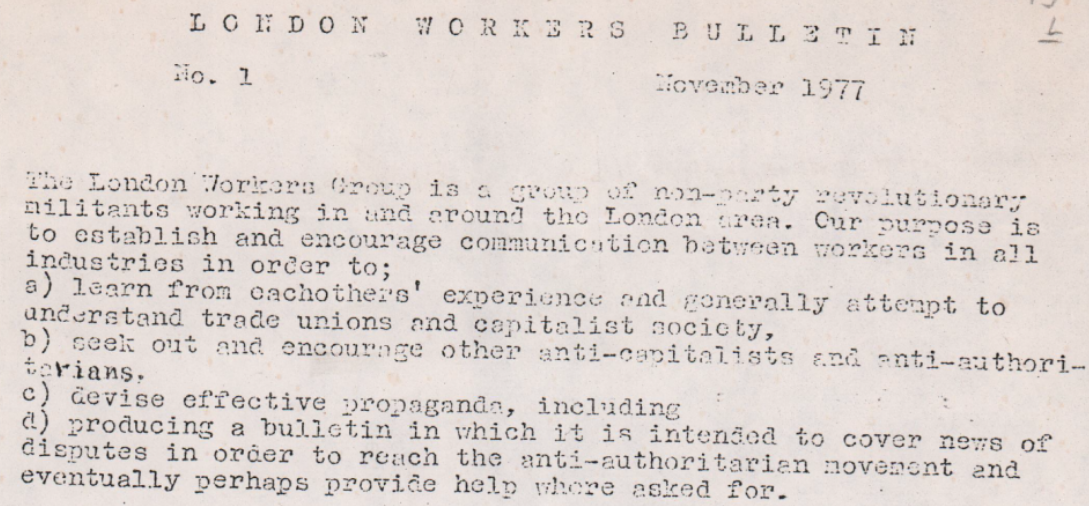The London Workers Group was a solidarity organisation and workers collective, open to all workers (employed or unwaged) in London. It was co-founded by Dave Morris, a core participant in the Inquiry. It was spied upon by HN20 ‘Tony Williams’ between 1978 and 1982 and the group was a named target in SDS Annual reports during this time.
Dave Morris, had previously written this short history of the LWG in 2006 and originally published on the website of the Radical History Network of North East London. This is a edited version of that piece:
The London Workers Group was founded in 1977. It was founded by a Guardian typist active in the NATSOPA Union chapel, a train driver from ASLEF, and an Islington postal worker. The three had met at a Libertarian Industrial Network conference in London - the LIN was a very loose national network of about 35 individuals active in various industries, but not organised geographically.

The LWG was a new kind of solidarity organisation - a very active libertarian workers collective, open to all workers (employed or unwaged) in London, engaged in providing solidarity to individuals in their own workplaces, supporting various disputes and discussing a wide range of issues. The politics was radical, libertarian and anti-capitalist, embracing a range of alternatives including workers councils, anarcho-syndicalism and anarchist communism. Meetings were open to all 'workers' in the widest sense, and non-sectarian. The group was pro-worker and supportive of any workplace disputes, but critical of wage-labour and trades unions.
The meetings were very lively, positive and generally focused on real life - rather than abstract ideology - and practical action. At the high point, weekly meetings were averaging 20 people attending (mostly employed workers). The group also produced widely-distributed and substantial down-to-earth news/discussion bulletins, distributed for free - over a period of 7 or 8 years.
The LWG initially met every fortnight in 'Rising Free'
(an anarchist bookshop in Islington), and then weekly in various pubs chosen to be near traditional employment hubs (The Earl Russell behind Kings X Station, and then The Metropolitan in Farringdon). There were regular publicised discussion meetings averaging monthly on all kinds of issues.
The LWG tried to forge links with a few other similar groups around the UK. At the end of the 1970s, at the LWG's initiative, a couple of conferences were held with the long-established Syndicalist Workers Federation
(mostly based in the north of England) and others, which led to some sharing of information and joint campaigns and ultimately the creation of a loose, federal 'Direct Action Movement'.
However, the second conference decided this should become formalised as a new anarcho-syndicalist individual membership organisation rather than an alliance of independent, libertarian local workers' groups. This effectively excluded the LWG, which was an open collective rather than a membership group, and which was supportive of a range of ideas including workers councils rather than just anarcho-syndicalism.
Towards the end the group became more ideological in content, and started also producing a glossy analytical magazine 'Workers Playtime' (produced cheap or free by printers active in the group) and a range of polemical leaflets for demonstrations and events.
The LWG gradually faded away during the mid-80s, some of the active members continuing to produce Workers Playtime, with special editions on the miners strike and then on the printing industry. Some went on to help form the anarchist organisation Class War.
During 1986-7, former LWG activists from within and without the print industry were actively involved in support for the Wapping pickets. This included practical support for the independent printworkers 'Picket' news bulletin, written by and for the printworkers in dispute. 5,000 copies were distributed weekly to strikers throughout the year-long dispute.
Sources:
Dave Morris. A short history of the London Workers Group.
Libcom. London Workers Group Bulletin (1977-1983).
